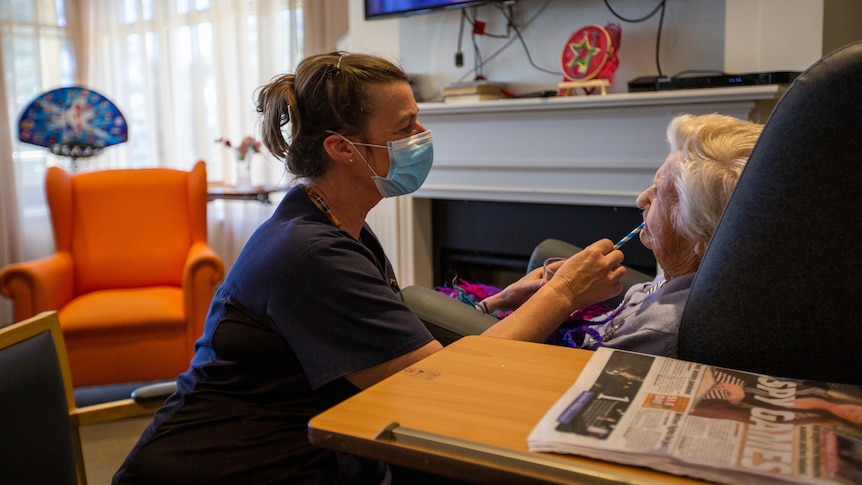Four years since COVID-19 spread around the world, medical researchers are still studying the effects on human health.

www.abc.net.au
Have you been infected with COVID-19 multiple times? There might be something else going on
By
Mazoe Ford
Posted Yesterday at 2:47pm
COVID infections put people more at risk of complications like heart disease and lung disease.(Pexels: Cottonbro Studio)
abc.net.au/news/nsw-multiple-covid-19-infections-health-immunology/103417278
- In short: Immunology experts say contracting COVID multiple times is a sign there could be a problem with the immune system.
- Researchers have found the more times you're infected the higher chance you have of developing long COVID or other chronic health conditions.
- Those at risk are urged to be up to date with their booster vaccinations.
The first time 41-year-old Evan James caught COVID-19 in 2022 he said it "absolutely destroyed" him.
He would go on to be infected another four times.
"Each time has been very different," Mr James told the ABC.
"The first time it wiped me out – three weeks are still a blur, I couldn't get up off the couch, I sweated constantly."
Evan James has had COVID five times.( ABC News: Mazoe Ford )
The Sydney barrister said he was asymptomatic the second and fourth times and had mild symptoms the third time, but by the fifth infection he was "hit very hard again" and was prescribed anti-viral medication.
Mr James was one of dozens of people who responded to an ABC News Sydney call out on social media to hear from people who had been infected with COVID-19 multiple times.
Seventy-six people wrote in with a range of symptoms, severity, and duration.
Most respondents had been reinfected three times, but there were also people who had tested positive four and five times.
One woman reported nine infections.
Why are people getting COVID-19 multiple times?
Professor Steven Faux, a rehabilitation and pain physician at Sydney's St Vincent's Hospital and co-director of the hospital's long COVID clinic, told the ABC there were two main explanations.
"Getting COVID-19 multiple times means either you're exposed to it a fair bit and you're not as diligent protecting yourself, or there might be something wrong with your ability to fight infections," Professor Faux said.
"It's probably the former, it's probably that people are now becoming lackadaisical about protection and that's not without reason because I think people are fed up, but it's still a serious illness, it's still more serious than flu.
"The fact that it's a highly contagious makes it more of a worry and it keeps mutating, so the vaccines are never absolutely perfect."
Professor Steven Faux said it's likely multiple COVID infections stem from lack of protection.(ABC News: Brendan Esposito)
Professor Stuart Tangye, the head of immunology and immunodeficiency laboratory at the Garvan Institute of Medical Research, said that people who keep getting infected should see a doctor.
"What COVID has shown us is that there are some people who have holes in their immune system," Professor Tangye said.
"If you're susceptible to repeated SARS-CoV-2 infections, maybe you've got an underlying immune problem so get it checked for peace of mind, but also for information."
How long should you self-isolate now COVID-19 cases are on the rise again?
It's strongly recommended people stay at home until their acute COVID symptoms subside. Here's what the experts say.

Read more
Professor Tangye said he would advise people who had tested positive over and over again to go to GP and get a referral to a clinical immunologist for a blood test to measure immune markers.
Mr James said he is planning to do that.
He is already immunocompromised because of autoimmune disease vitiligo, and because he has had whooping cough several times despite being regularly vaccinated against it.
He wants to find out more about the effect COVID-19 is having on his body.
"Part of [catching COVID-19 five times] is the nature of my work, because at court you're exposed to so many people, you're always a high risk of catching whatever is going around," he said.
"But I'm hoping that I can get an appointment to eventually to see an immunologist."Professor Stuart Tangye said repeated COVID infections could be related to immunity concerns.(Supplied)
Four years since COVID-19 spread around the world, medical researchers are still studying the effects on human health.
"The picture that's starting to come together is clearly the more times you do get infected with SARs-CoV-2, the more you're at risk of ongoing clinical complications [such as] heart disease, lung disease, kidney disease," Professor Tangye said.
"And the more times you get infected, the higher likelihood you're going to have long COVID or chronic health conditions manifesting in time, so it's an ongoing problem."
Who can get a booster shot now?
Professors Faux and Tangye said people should discuss booster vaccinations with their GPs.
The Australian Government's current advice about booster shots is that they are "recommended" for:
- All adults aged 65 years and over
- Those aged 18-64 who have medical comorbidities that increase their risk of severe COVID-19
- Those aged 18-64 who have a disability with significant or complex health needs
The advice also states that adults without risk factors for severe COVID-19 and children over five with medical comorbidities that increase their risk of severe COVID-19 illness or with a disability or complex health needs, can "consider" a booster dose.
A second booster dose is recommended for all adults aged 75 years and over.
Professor Raina MacIntyre said the mentality to COVID needs to be moved forward to the present day.(ABC News: Brendan Esposito)
Professor Raina MacIntyre, the head of the biosecurity program at the Kirby Institute at the University of NSW, said she thought Australia's vaccine policies were "too restrictive".
"A problem around COVID is that we're still stuck in a 2020 mentality, and in 2020 it was clear that it was older people who were dying and getting hospitalised," she told the ABC.
"That remains true, but we've now got mountains and mountains of data showing that it's a serious infection in any age group.
"We've had so many stories about athletes and healthy young people either dropping dead, or having a cardiac arrest, or developing long COVID and becoming debilitated, so if you don't think you're vulnerable COVID might make you vulnerable."
Experts call on government to act as COVID vaccine rates fall in aged care
COVID-19 is on the rise while vaccine rates are falling in aged care. Experts are calling on the government to act.

Read more
Professor Faux said anyone who is not in the "recommended" vaccine booster categories, but still feels at risk because of their job or lifestyle should get a booster.
"Some of the public health people might say, 'if you're fit don't worry about it', but if you're going to be in situations where you have no idea about the risk pool I would recommend regular vaccinations."
"This doesn't stop you from catching it, but it does is it means you're not going to be out of the picture for a long time and won't be admitted to hospital."
Posted Yesterday at 2:47pm

